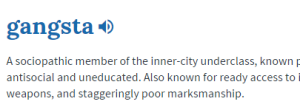This week, I came across a Facebook post with personal branding implications that sparked a lively debate. A well-known copywriting and marketing expert, Bob Bly, lamented in a post on his Facebook page that a young marketing expert congratulated himself on a presentation he had given, referring to himself as “gangsta.” This proclamation led the veteran marketer to question why many people use social media to stroke their egos. And, he suggested that self-promotion on social media was more prevalent among Millennials. His post elicited more than 100 comments, including several exchanges between Bly and his audience. Not surprisingly, some Millennials in his community disagreed with how he characterized their generation. This post is not about whether Bob Bly was right or wrong but rather a reflection on the impact of social media self-promotion on brands.
Stand for Something
This issue is about brand positioning. By definition, positioning is articulating a real point of difference that is relevant to your target market or community. The “young turk” (using Bly’s words) may have insight that tells him his tribe of followers would find his description of gangsta appealing and his product (marketing expertise) interesting. In essence, the young expert appears to have positioned himself as cool and edgy. Such perceptions will likely resonate within a significant part of his community. The worst scenario this marketer (or any brand- product or personal) could face is being irrelevant due to a perception of not standing for something.
Positioning ≠ Popularity
Brand positioning is one of the most important strategic decisions a brand owner faces. Why? The harsh reality is that not everyone likes you or your offering. A whole host of reasons could be cited- price is too high, quality is questionable, you are perceived as too brash because you refer to yourself as gangsta- I’ll cut off the list here or else I would have to go on and on. But, you get the point; marketing is not a popularity contest. Your brand will appeal to a certain audience, and it will not matter to other audiences. You can live with that as long as you are in tune with the audience that cares about you and perceives you care about them. Thus, brand positioning is so important because it guides decisions about who you seek to engage with your brand and how you go about doing so.
Is It OK to be Gangsta?
If you take a bold positioning approach for your personal brand such as the gangsta persona in this example, know that you will turn off some people. The question is whether your position will be relevant to enough people that the value you offer will be rewarded. Also, brand positions often evolve as customers’ needs and market preferences shift. So, the young “gangsta marketer” of 2014 will likely position himself differently at some point in the future. And, positioning, like marketing in general, is about the benefit of your offering to your community. Position your brand to answer “what’s in it for me” that your audience is constantly asking. Understanding how to answer that question will ultimately shape your brand identity.

